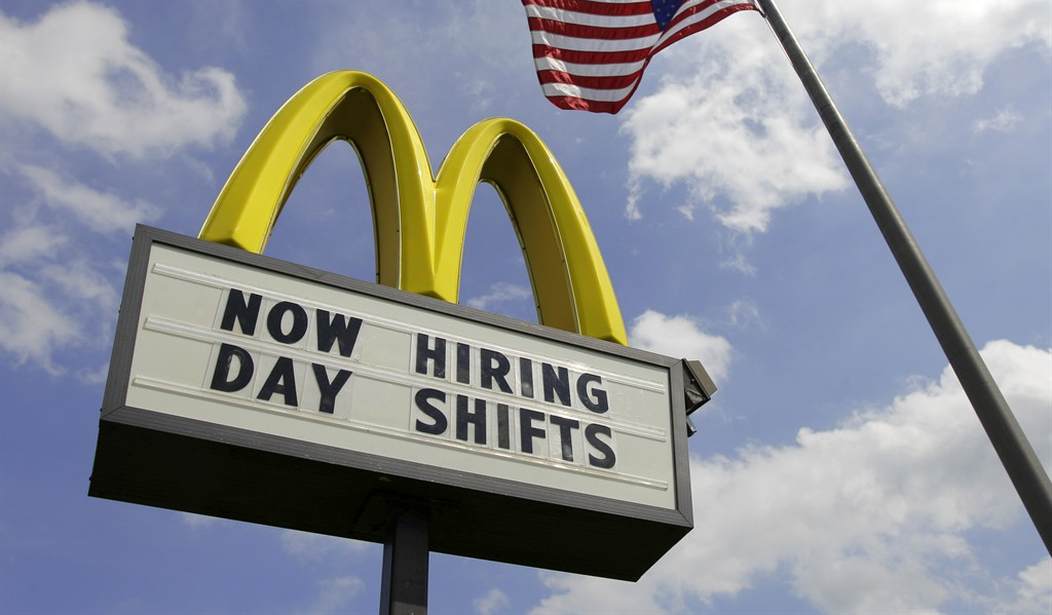On August 19, the Cato Institute released a study by me and Charles Hughes, The Work vs. Welfare Trade-Off, 2013: An Analysis of the Total Level of Welfare Benefits by State, showing that a family collecting welfare benefits from seven common programs – Temporary assistance for Needy Families (TANF), food stamps, Medicaid, WIC, public housing assistance, utilities assistance (LIHEAP) and free commodities – could receive more than what a minimum wage job would pay in 35 states. Critics responded: so raise the minimum wage.
Making work pay better, including the sort of entry level jobs that people leaving welfare can expect to find, is a terrific goal. Unfortunately, government has very little ability to force such increases. Attempts to simply mandate that businesses pay more, through increased minimum wages or living wage laws, as well as attempts to mandate employee benefits like health insurance (see Obamacare), primarily result in fewer jobs.
The amount of compensation a worker receives is more or less a function of his or her productivity. As Greg Mankiw, Chairman and Professor of Economics at Harvard University explains, “Economic theory says that the wage a worker earns, measured in units of output, equals the amount of output the worker can produce.” This somewhat oversimplifies, of course. There are other factors involved. But one can’t just arbitrarily declare a worker’s value.
The academic evidence on this point is pretty clear. A comprehensive review of more than 100 studies on the minimum wage by David Neumark and William Wascher for the National Bureau of Economic Research found that 85 percent of the studies they reviewed found negative employment effects. Newmark and Wascher concluded, “the preponderance of the evidence points to disemployment effects… [and] studies that focus on the least-skilled groups provide relatively overwhelming evidence of stronger disemployment effects for these groups.”
Recommended
Indeed, evidence of employment losses goes all the way back to 1938 and first federally imposed minimum wage. The U.S. Department of Labor concluded that that first 25-cent minimum wage resulted in the loss of 30,000 to 50,000 jobs, or 10 to 13 percent of the 300,000 workers affected by the increase.
More recently, Michael Hicks of Ball State University looked at the impact of the July 2008 minimum wage increase on unemployment rates in the United States and concluded that a 10 percent increase in the minimum wage results in a roughly 0.19 percent increase in unemployment, meaning the loss of about 160,000 jobs.
And, a study by Joseph Sabia and Richard Burkhauser for the Employment Policy Institute concluded that an increase in the federal minimum wage to $9.50 would result in the loss of 1.3 million jobs, primarily low-skilled jobs. Moreover, Sabia and Burjhauser concluded that there would be very little gain in exchange for this pain. According to their research, state and federal minimum wage increases between 2003 and 2007 had no effect on state poverty rates.
Or simply look at how Obamacare’s employer mandate is causing businesses to shift workers to part time or to reduce hiring in response to higher labor costs.
We should understand that for most low skilled workers, such as the hypothetical mother in our welfare study, a minimum wage job is a starting point, not a destination. Nearly two-thirds of minimum wage workers receive a raise within one year, with the median hike for full-time workers about 14 percent. Indeed, we know that just 2.6 percent of full-time workers (including minimum wage workers) live in poverty.
That is not to say we shouldn’t try to increase entry level wages. But the best way to accomplish that goal is to create a climate that leads to greater economic growth overall. Greater prosperity eventually finds its way into higher wages for workers, including those at the bottom of the ladder. That means reducing taxes and regulations to encourage people to invest and expand their businesses.
Somehow, I don’t think that is what most critics of our study have in mind.

























Join the conversation as a VIP Member